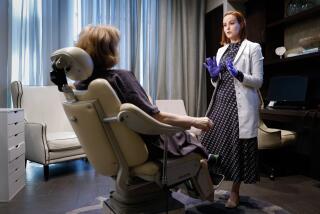Doctors who lose gain credibility
- Share via
At nearly 6 feet and 286 pounds, Dr. Michael Fleming recently began thinking about what it meant to be handing out advice about diet and exercise when he wasn’t practicing what he preached.
Fleming, whose family history is rife with heart attacks and obesity, was about to become president of the American Academy of Family Physicians -- a group that was launching a 10-year national fitness initiative. He’d long chafed at the jokes made by friends who said they’d become his patients because he wasn’t one to talk about slimming down. But then something his rail-thin wife said about their four grandchildren made him think it was time to get off his duff.
She asked, “Do you want to be around to watch them grow up?”
At that point, Fleming, 53, of Shreveport, La., realized that he had to take charge of his health. At the same time, as the academy’s incoming president, he could set an example for fellow physicians and patients.
In August, Fleming resolved to give up his carbohydrate-loving ways and get back to exercise, something he hadn’t done since high school athletics, where the thinking was “big guys are good.”
On Sept. 30, at the academy’s annual meeting, a few days before he assumed its presidency, he challenged his colleagues to follow his lead. He encouraged them to buy pedometers to help attain a federal goal of 10,000 steps a day, to monitor their weight and to live a healthier life.
Dr. Robert Pallay, a family physician in Hillsborough, N.J., and chairman of the academy’s new Americans in Motion program, said the first step toward improving the nation’s health is to get family doctors “to walk the talk.” That gives them credibility.
“The thought was, if we can work on getting members of our specialty fit, we’ll have a better shot at convincing the patients,” he said. Doctors still command respect, so if patients see physicians committing to fitness, “they’re more prone to believe there’s something to it” and more open to making healthful behavioral changes..
Since late August, Fleming has peeled off 17 pounds. He fights to keep his pants up, and his suits need altering.
Patients tell him they see the changes. Some are asking for help with their weight struggles. They’ve told him: “If you can do it, I can do it.”
Fleming still remembers the hypocrisy decades ago of a doctor standing beside his grandfather’s bedside, after the last of his grandpa’s several heart attacks. “The doctor told my grandfather he had to quit smoking and then snuffed out his own cigarette.”
Positive examples work, said Lola O’Rourke, a registered dietitian in Seattle. If a patient goes to an overweight doctor, he or she may think, “Why should I listen to this person who obviously doesn’t know how to deal with it?” But if they see the doctor making changes in diet and exercise, “it could create some empathy. It could give them something to talk about.
“Health professionals dealing with people struggling with weight need to be setting a good example,” O’Rourke said.
Carol Grench, a family physician in Davis, Calif., figures she’s carrying an extra 60 pounds on her 5-foot-6 frame but says, “I don’t eat a bad diet. I don’t eat sweets and I don’t each much fat, except for the stuff that comes into the office.” Like many folks battling middle-age spread, she’s suffered knee and back injuries that made playing soccer and going to the gym increasingly difficult. After rehabilitation following her fourth knee operation, she abandoned the gym-going because it was cutting into precious time with her husband and teenage daughter.
At 46, she says, “I don’t think I’ll ever be 140 pounds again. But if I’d lose 30 pounds, I’d be happy. Exercising is the key.”
Grench purchased a recumbent exercise bike (an upright bike gives her sciatica), which she uses for 30 minutes every evening she’s home before 9 p.m. On weekends she rides for 45 minutes each day.
Grench has always felt empathy for overweight patients. She’s been through the diets. She understands “all about the different triggers that make you eat.” She knows firsthand that on long days at the office, “you get so tired and so wiped out that the only thing that picks you up is food.” She knows exercise can be hard when you’re overweight because of all the aches and pains.
So far, a few patients have commented on her improved shape. She’s not ready to bring it up with most patients, though, until she has more -- or literally less -- to show for her recent efforts.
Then, she says, “it will be leading by example.”






